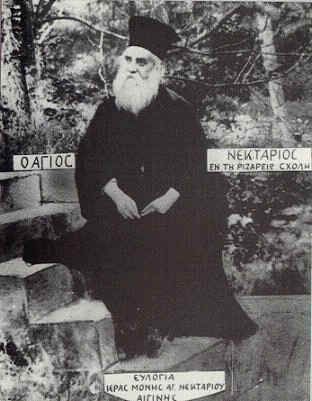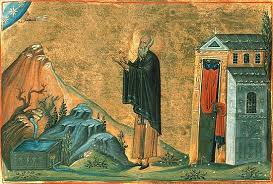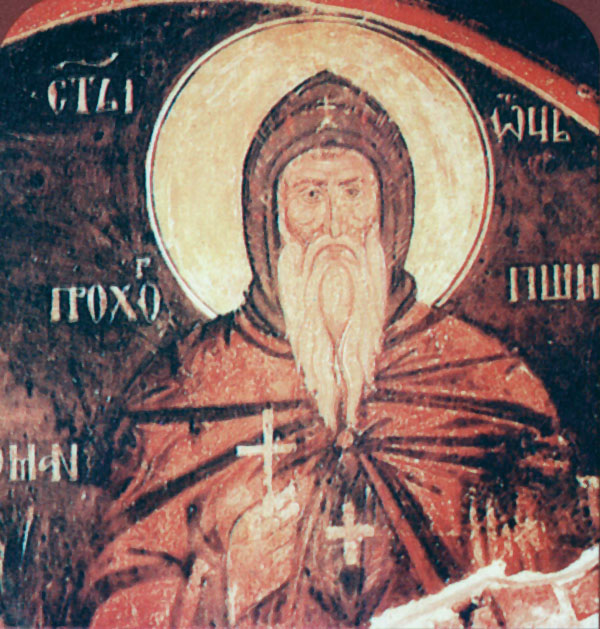 Saints Joachim and Anna who lived in Nazareth in Galilee “in the whole piety of the Mosaic law,” up to their very old age had no children. On one great feast the righteous Joachim, according to the custom of the law, gave gifts and offerings to God in the temple in Jerusalem. The high priest Issachar who accepted the offerings of the numerous throngs of people, did not want to accept the gifts from Joachim, telling him: “It is not right to accept gifts from you as from a true Israelite; for you are childless. Because of some kind of heavy sins you have not received the blessing of God.”
Saints Joachim and Anna who lived in Nazareth in Galilee “in the whole piety of the Mosaic law,” up to their very old age had no children. On one great feast the righteous Joachim, according to the custom of the law, gave gifts and offerings to God in the temple in Jerusalem. The high priest Issachar who accepted the offerings of the numerous throngs of people, did not want to accept the gifts from Joachim, telling him: “It is not right to accept gifts from you as from a true Israelite; for you are childless. Because of some kind of heavy sins you have not received the blessing of God.”
Struck by the speech of the High Priest, as though by the awesome verdict of the judgment of God Himself, the righteous man had no time even to withdraw from the altar, as a new heavier insult struck his hearing. One of the Israelites bringing his gifts, pushed him away, said, “Depart from here, did you not hear that you are unworthy to bring gifts to God together with us, because you have not left offspring for Israel?” With deep humility Joachim accepted this accusation as if it were from the mouth of the very God, and with deep sadness left the temple. With a painful heart he recognized himself unworthy not only to remain in the sight of the house of God, but also to return to his own house, and he withdrew to the desert, where he grazed his cattle. In fasting and repentance, in tears and prayer he spent 40 days, imploring the Lord to forgive him all his sins, to remove his dishonor in Israel, to bless him in old age by the birth of a child.
Commemorated on December 7/December 20
 This great holy father of the Orthodox Church was of eminent birth. His father was the imperial deputy of Gaul and Spain and was a pagan by faith, but his mother was a Christian. While he was still in the cradle, a swarm of bees settled on him, poured honey onto his lips, and flew away. And while still a child, he extended his hand and spoke prophetically: ``Kiss it, for I will be a bishop.''
This great holy father of the Orthodox Church was of eminent birth. His father was the imperial deputy of Gaul and Spain and was a pagan by faith, but his mother was a Christian. While he was still in the cradle, a swarm of bees settled on him, poured honey onto his lips, and flew away. And while still a child, he extended his hand and spoke prophetically: ``Kiss it, for I will be a bishop.''
After his father's death, the emperor appointed him as his representative in the province of Liguria, of which Milan was the chief city. When the bishop of Milan died, a great dispute arose between the Orthodox Christians and the Arian heretics concerning the election of a new bishop. Ambrose entered the church to maintain order, this being his duty. At that moment, a child at its mother's bosom exclaimed: ``Ambrose for bishop!'' All the people took this as the voice of God, and unanimously elected Ambrose as their bishop, contrary to his will. Ambrose was baptized, passed through all the necessary ranks and was consecrated to the episcopacy, all within a week. As bishop, Ambrose strengthened the Orthodox Faith, suppressed the heretics, adorned churches, spread the Faith among the pagans, wrote many instructive books, and served as an example of a true Christian and a true Christian shepherd. He composed the famous hymn ``We Praise Thee, O God.'' This glorious hierarch, whom men visited from distant lands for his wisdom and sweetness of words, was very restrained, diligent and vigilant. He slept very little, labored and prayed constantly, and fasted every day except Saturday and Sunday. Therefore, God allowed him to witness many of His miracles and to perform miracles himself. He discovered the relics of the Holy Martyrs Protasius, Gervasius, Nazarius and Celsus (October 14). Meek toward lesser men, he was fearless before the great. He reproached Empress Justina as a heretic, cursed Maximus the tyrant and murderer, and forbade Emperor Theodosius to enter a church until he had repented of his sin. He also refused to meet with Eugenius, the tyrannical and self-styled emperor. God granted this man, so pleasing to Him, such grace that he even raised the dead, drove out demons from men, healed the sick of every infirmity, and foresaw the future. Ambrose died peacefully on the morning of Pascha in the year 397.
 MEMRA – WORDS, Meaning And Faith
MEMRA – WORDS, Meaning And Faith
A new 2018-19 series of articles shared on the roots and the prospects that unite Eastern and Oriental Oxthodox Traditions to the realm of Jewishness and Hassidism,
Compared semantics and exegetical “paysages” by archpriest Alexander Winogradsky Frenkel (Patriarchate of Jerusalem). Below the eighth article.
Translation of the relics of St. Nectarios of Aegina, August 21/September 3
Selected Passages From the Writings of Orthodox Saints, Compiled by Father Demetrios Serfes.
* * *
Christianity.
 The Christian religion is not a certain philosophic system, about which learned men, trained in metaphysical studies, argue and then either espouse or reject, according to the opinion each one has formed. It is faith, established in the souls of men, which ought to be spread to the many and be maintained in their consciousness.
The Christian religion is not a certain philosophic system, about which learned men, trained in metaphysical studies, argue and then either espouse or reject, according to the opinion each one has formed. It is faith, established in the souls of men, which ought to be spread to the many and be maintained in their consciousness.
There are truths in Christianity that are above out intellectual comprehension, incapable of being grasped by the finite mind of man. Our intellect takes cognizance of them, becomes convinced of their reality, and testifies about their supernatural existence.
 Saint Abramius the Hermit and Blessed Maria, his niece of Mesopotamia, lived the ascetic life in the village of Chidan, near the city of Edessa. They were contemporaries and fellow countrymen of Saint Ephraim the Syrian (January 28), who afterwards wrote about their life.
Saint Abramius the Hermit and Blessed Maria, his niece of Mesopotamia, lived the ascetic life in the village of Chidan, near the city of Edessa. They were contemporaries and fellow countrymen of Saint Ephraim the Syrian (January 28), who afterwards wrote about their life.
Saint Abramius began his difficult exploit of the solitary life in the prime of youth. He left his parents’ home and settled in a desolate wilderness place, far from worldly enticements, and he spent his days in unceasing prayer. After the death of his parents, the saint refused his inheritance and requested his relatives to give it away to the poor. By his strict ascetic life, fasting, and love for mankind, Abramius attracted to him many seeking after spiritual enlightenment, prayer and blessing.
 He was a contemporary and friend of St John of Rila and St Gabriel of Lesnov. In response to his prayers, God showed him the place where he was to live in asceticism - a wooded area near the river Pchinja. There St Prochorus lived till old age, and there he died. Only the one, all-seeing God can know all the labours and temptations that he endured throughout his asceticism, but one can judge from his relics, from which myrrh flows forth, and the miracles of healing wrought by him to this day, both the greatness of his asceticism and the greatness of God"s grace given to him as a reward for his great labours. St Prochorus entered into rest and went to the heavenly Kingdom in the eleventh century.
He was a contemporary and friend of St John of Rila and St Gabriel of Lesnov. In response to his prayers, God showed him the place where he was to live in asceticism - a wooded area near the river Pchinja. There St Prochorus lived till old age, and there he died. Only the one, all-seeing God can know all the labours and temptations that he endured throughout his asceticism, but one can judge from his relics, from which myrrh flows forth, and the miracles of healing wrought by him to this day, both the greatness of his asceticism and the greatness of God"s grace given to him as a reward for his great labours. St Prochorus entered into rest and went to the heavenly Kingdom in the eleventh century.
 Saints Joachim and Anna who lived in Nazareth in Galilee “in the whole piety of the Mosaic law,” up to their very old age had no children. On one great feast the righteous Joachim, according to the custom of the law, gave gifts and offerings to God in the temple in Jerusalem. The high priest Issachar who accepted the offerings of the numerous throngs of people, did not want to accept the gifts from Joachim, telling him: “It is not right to accept gifts from you as from a true Israelite; for you are childless. Because of some kind of heavy sins you have not received the blessing of God.”
Saints Joachim and Anna who lived in Nazareth in Galilee “in the whole piety of the Mosaic law,” up to their very old age had no children. On one great feast the righteous Joachim, according to the custom of the law, gave gifts and offerings to God in the temple in Jerusalem. The high priest Issachar who accepted the offerings of the numerous throngs of people, did not want to accept the gifts from Joachim, telling him: “It is not right to accept gifts from you as from a true Israelite; for you are childless. Because of some kind of heavy sins you have not received the blessing of God.”
 This great holy father of the Orthodox Church was of
This great holy father of the Orthodox Church was of  MEMRA – WORDS, Meaning And Faith
MEMRA – WORDS, Meaning And Faith The Christian religion is not a certain philosophic system, about which learned men, trained in metaphysical studies, argue and then either espouse or reject, according to the opinion each one has formed. It is faith, established in the souls of men, which ought to be spread to the many and be maintained in their consciousness.
The Christian religion is not a certain philosophic system, about which learned men, trained in metaphysical studies, argue and then either espouse or reject, according to the opinion each one has formed. It is faith, established in the souls of men, which ought to be spread to the many and be maintained in their consciousness. Saint Abramius the Hermit and Blessed Maria, his niece of Mesopotamia, lived the ascetic life in the village of Chidan, near the city of Edessa. They were contemporaries and fellow countrymen of Saint Ephraim the Syrian (January 28), who afterwards wrote about their life.
Saint Abramius the Hermit and Blessed Maria, his niece of Mesopotamia, lived the ascetic life in the village of Chidan, near the city of Edessa. They were contemporaries and fellow countrymen of Saint Ephraim the Syrian (January 28), who afterwards wrote about their life. He was a contemporary and friend of St John of Rila and St Gabriel of Lesnov. In response to his prayers, God showed him the place where he was to live in asceticism - a wooded area near the river Pchinja. There St Prochorus lived till old age, and there he died. Only the one, all-seeing God can know all the labours and temptations that he endured throughout his asceticism, but one can judge from his relics, from which myrrh flows forth, and the miracles of healing wrought by him to this day, both the greatness of his asceticism and the greatness of God"s grace given to him as a reward for his great labours. St Prochorus entered into rest and went to the heavenly Kingdom in the eleventh century.
He was a contemporary and friend of St John of Rila and St Gabriel of Lesnov. In response to his prayers, God showed him the place where he was to live in asceticism - a wooded area near the river Pchinja. There St Prochorus lived till old age, and there he died. Only the one, all-seeing God can know all the labours and temptations that he endured throughout his asceticism, but one can judge from his relics, from which myrrh flows forth, and the miracles of healing wrought by him to this day, both the greatness of his asceticism and the greatness of God"s grace given to him as a reward for his great labours. St Prochorus entered into rest and went to the heavenly Kingdom in the eleventh century.